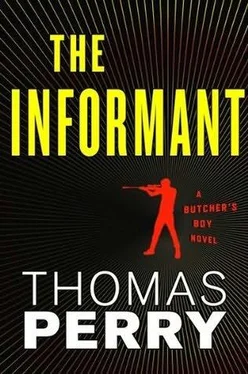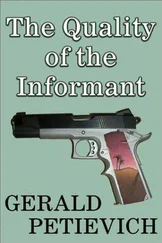Thomas Perry - The Informant
Здесь есть возможность читать онлайн «Thomas Perry - The Informant» весь текст электронной книги совершенно бесплатно (целиком полную версию без сокращений). В некоторых случаях можно слушать аудио, скачать через торрент в формате fb2 и присутствует краткое содержание. Жанр: Триллер, на английском языке. Описание произведения, (предисловие) а так же отзывы посетителей доступны на портале библиотеки ЛибКат.
- Название:The Informant
- Автор:
- Жанр:
- Год:неизвестен
- ISBN:нет данных
- Рейтинг книги:5 / 5. Голосов: 1
-
Избранное:Добавить в избранное
- Отзывы:
-
Ваша оценка:
- 100
- 1
- 2
- 3
- 4
- 5
The Informant: краткое содержание, описание и аннотация
Предлагаем к чтению аннотацию, описание, краткое содержание или предисловие (зависит от того, что написал сам автор книги «The Informant»). Если вы не нашли необходимую информацию о книге — напишите в комментариях, мы постараемся отыскать её.
The Informant — читать онлайн бесплатно полную книгу (весь текст) целиком
Ниже представлен текст книги, разбитый по страницам. Система сохранения места последней прочитанной страницы, позволяет с удобством читать онлайн бесплатно книгу «The Informant», без необходимости каждый раз заново искать на чём Вы остановились. Поставьте закладку, и сможете в любой момент перейти на страницу, на которой закончили чтение.
Интервал:
Закладка:
Vince drove past, then turned into the next farm road. Schaeffer said, "All right. Wait for me here. If it's a trap you can take off."
"If you get in trouble, try to make it back. I won't take off," Vince said. He leaned back in his seat and watched Schaeffer walk to the fence, climb over it, and make his way into the tall rows of corn beyond it. To his left, at the back of the farm, behind the cornfield, was a large, old apple orchard full of short, gnarled trees with thick, twisted trunks, but the corn rows were closer to the house.
Schaeffer took one look back at Vince and saw him in the driver's seat, his face impassive-watchful, merely waiting. Schaeffer went deeper into the cornfield, at first making his way quickly between the rows. But as he approached the gravel driveway through the cornfield, he moved more slowly and carefully, adjusting his position from row to row, not letting himself brush against the cornstalks so the leaves wouldn't make whispering sounds. He backtracked three rows so he could see Fantano's car and the house, but anyone inside could not see him. He took out his gun and aimed it down the open space between rows. As soon as someone stepped into that empty frame, the person would die.
As he thought about that bright, warm morning after all these years, he remembered the physical sensation he had felt when he realized it was a trap. Fantano had been expecting them, and he had led them to the farm. As Schaeffer was taking his position in the cornfield, eight of Fantano's men were emerging from the back door of the farmhouse and forming a line at the upper end of the cornfield.
When they were all lined up at the first row of corn, on some silent signal they began to move into the corn. They advanced one row at a time, then stopped to sight along the furrow to be sure all of them were still aligned and nobody got ahead of the others and got mistaken for a target. They were just five or six rows from Schaeffer before he saw the light catch the white shirt one of them wore. It shone through the tiny gaps in the green cornstalks and leaves. He sidestepped to get out of the man's path and saw another, then another coming his way.
He dashed down the long corn row toward the end where he could see the porch of the house. In thirty seconds he was crouching beside the house. He knew he had one chance. He crept along the siding until he was beside a tall window.
He pivoted and stepped in front of the window. Tony Fantano was standing in the middle of an old-fashioned parlor, staring out the opposite window at the men in the cornfield. He seemed to have a sudden premonition, a discomfort that was mental, not sensory, because there had been no noise. He turned and saw Schaeffer looking in at him.
Schaeffer fired four rapid shots through the glass and caught Fantano twice in the chest as a splash of shattered glass sprayed the room. A bullet went through Fantano's neck, and the last one hit the wall as Fantano fell backward onto the floor. Schaeffer took aim at his head and fired, then ran around to the front porch and looked in the front window, across the room, and through the window where Fantano had been watching his men. As he looked, he ejected the magazine from his gun and inserted a fresh one.
He saw three men with guns in their hands run out of the cornfield and head for the back of the house. Schaeffer knelt on the porch in front of the window and aimed his pistol through it, across the living room, down the short, straight hallway to the back door.
The back door swung open and the three men ran in and stopped at the sight of Fantano on the floor. Schaeffer opened fire and dropped all three. He flung the front door open and ran to the three bodies. He snatched the guns out of the hands of two of the dead men, put them in his jacket pockets, and kept going down the hall and out the back door.
He ran to the back corner of the cornfield to get behind the remaining men. But just as he entered the field, he heard gunshots. They seemed to be coming from the road ahead of him where he had left Vincent Pugliese and the car.
He veered away from the cornfield and into the orchard beside it. He caught sight of two men ahead of him running along the first two rows of cornstalks toward the road. He stopped, steadied his arm on a tree limb, and hit the back one, then the other, and ran on.
The firing up ahead was now heavier and more sustained. He ran through the orchard, swerving to miss tree trunks, jumping over exposed roots. He moved far enough into the orchard so the trunks of the trees provided some concealment and protection, but he could tell from the sounds that nobody was shooting at him.
At last he reached the far end of the orchard and looked out to see Vince Pugliese crouching behind the stolen Impala. Three men crouched in the cornfield shooting at him. The car's windows were almost all gone, and glittering cubes of shattered safety glass had spattered all over the road. There were bullet holes in the door panels, and at least one tire was flat.
Schaeffer slipped out of the orchard into the cornfield, stepped into the next row, then the next. He saw a man three rows ahead lying on his belly in a furrow aiming his pistol at Vince. Schaeffer shot him, then ran ahead from row to row, shot the second, then shot the third. None of the men ever heard him or looked in his direction. Even the last one he killed seemed to think to the end that the firing he heard was his companions firing at Vince Pugliese.
When the last one was dead, he yelled, "Vince!"
"Don't bother me. I've got these guys outnumbered."
"They're dead."
"All of them?"
"Yes."
Schaeffer stepped out of the cornfield and Pugliese stepped hesitantly around the trunk of the car. When there were no shots, he put his gun in his coat and pointed at the Impala. "The car's no good anymore."
"We can take Fantano's. Let's wipe this one for prints and go."
They wiped the surfaces clean, took off the Illinois plates, and trotted through the cornfield to the house. Inside the parlor Schaeffer stepped carefully around the blood, reached into Fantano's pants pocket, and took his keys.
As Vince drove them down the gravel drive to the highway, manic elation overtook the two twenty-year-olds. They sped along the rural highway, neither of them having to admit that he'd been sure they were about to die, but both feeling shock and relief that they hadn't. Each of them felt grateful to the other for being brave enough to keep half of Fantano's soldiers occupied for so long. Each of them had become the only witness to the other's victory.
Now, thirty years later, when Schaeffer read the personal ad in the newspaper, he felt an instant of sincere pleasure at the memory of the young Vince Pugliese. But the pleasure was followed immediately and overwhelmed by the unwelcome memory of how the Mafia worked. The one you liked, respected, and trusted most was always the one they sent to invite you to your death.
21
The invitation was a trap. He looked at the personal ad one more time, let out a breath in disapproval, then started to fold the paper, but his eyes passed over another personal ad and stopped.
"I've known about you for twenty years, but only met you on August 30. You've got troubles, so talk to me."
It was Elizabeth Waring. Another trap, this one from the opposite side of the universe. Both sides had realized how vulnerable he was, and each hurried to roll him in before the other side could. He wondered if, when each of them checked the newspapers today to be sure their ad had run, they would each notice the other ad. Probably Elizabeth Waring would.
He decided that it was time to turn in his rental car and buy a vehicle that nobody was going to care about and want him to return. He drove to two used-car lots before he found the right make and model, the right color in the right condition. It was a Toyota Camry, which he had read was the most popular model in the United States. Even if it hadn't been, there were enough models that looked nearly like it to make it unmemorable. It was gray, and when it was on the road it seemed practically invisible. It was five years old, and so it was cheap but serviceable. He used the bank account he had opened in Scottsdale to write a check for it and signed Charles F. Ackerman.
Читать дальшеИнтервал:
Закладка:
Похожие книги на «The Informant»
Представляем Вашему вниманию похожие книги на «The Informant» списком для выбора. Мы отобрали схожую по названию и смыслу литературу в надежде предоставить читателям больше вариантов отыскать новые, интересные, ещё непрочитанные произведения.
Обсуждение, отзывы о книге «The Informant» и просто собственные мнения читателей. Оставьте ваши комментарии, напишите, что Вы думаете о произведении, его смысле или главных героях. Укажите что конкретно понравилось, а что нет, и почему Вы так считаете.












